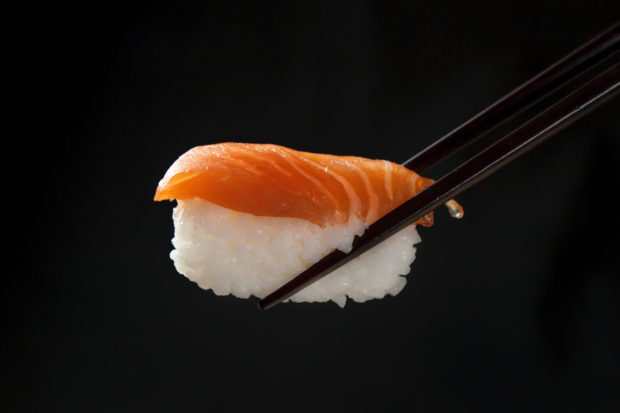
Cell-based fish may soon feature on restaurant menus. Image: Kelvin Zyteng on Unsplash via AFP Relaxnews
Excellent for sushi, sashimi and maki, Wildtype’s salmon is as versatile as the real thing. However, this is fish that has never been anywhere near the sea.
The Californian start-up has grown it in a lab using stem cells taken from wild Pacific salmon. The goal of the company, which was founded by a cardiologist and a diplomat, is to protect the dangerously low stocks of real fish.
According to the World Wide Fund for Nature, stocks of salmon are under threat. Global consumption of the fish has tripled since the 1980s. Some 93% of Atlantic salmon is now farmed, and wild salmon stocks are not only threatened by overfishing, but also by global warming — like most fish, salmon are cold-blooded — and dwindling levels of prey.
The goal adopted by the young founders of Wildtype, who have garnered support from several business angels, is to continue to fulfill the strong consumer demand for one of the world’s favorite foods, which is largely fueled by its use in sushi.
They also point out that their product has certain advantages, notably that it is completely free of antibiotics, mercury and microplastics.
The company is also determined to make salmon that is indistinguishable from the real thing. With this in mind, they have called on large numbers of American chefs to test out their product before putting it on their menus.
Salmon is not the only species to be tested in stem-cell projects. Other companies are working on lab-grown beef that could, in the future, put an end to the disastrous impact of intensive livestock farming.
They include the Israeli start-up Aleph Farms, which recently made headlines when it claimed to have produced the world’s first in-vitro grown steak. In Essonne, France, researchers have set their sights on another contested source of animal protein, foie gras, which they are intent on producing from cultured duck cells. IB
RELATED STORIES:
Fast food chains reimagine restaurants’ design to be more eco-friendly
Eating more probiotic foods could help improve depression, says study